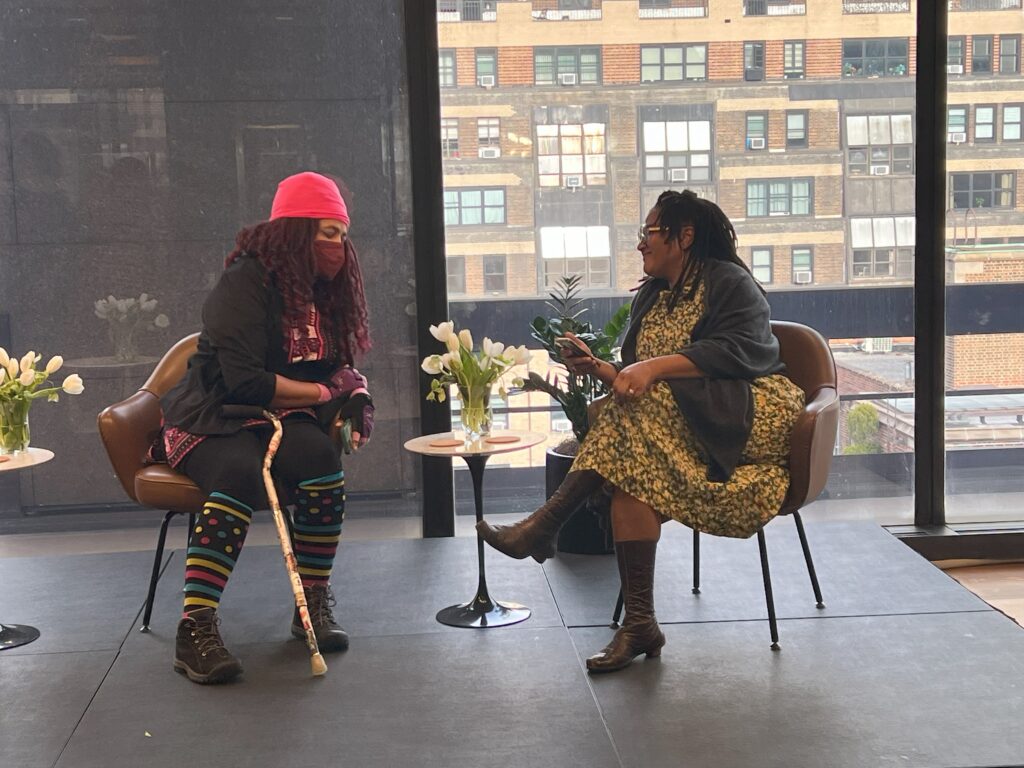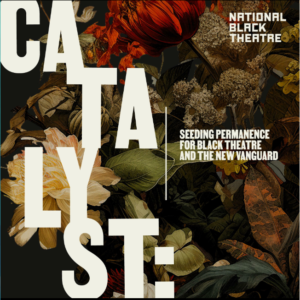
Claudia Alick was invited to join Catalyst 2023-2024 | Seeding Permanence for Black Theatre and the New Vanguard, a 2-day convening, building on the work National Black Theatre conceived and led in 2013, with Catalyst: Moving the Black Theater Legacy Forward. The newest iteration of this strategic think tank will convene over 50 Black theatrical individual artists, theater institutions in addition to producers and advocates who support that ecosystem. The focus of these two days will be to engage in acknowledging and mark the current members of the ecosystem, identifying the complexities involved in seeding permanence in an ever shifting landscape and naming the ways forward for both individual artists and institution builders to dream into for a healthier, sustainably equitable and more valued field for Black Theatre. Through clarifying our current context and engaging questions around liberatory practice, the power of cultural capital, visibility and resource shifts, Catalyst intends to be a space of radical truth telling in service of generating a bold strategic movement forward towards thrivability. The gathering in NYC Dec 2023 was accessible and full of joy. Below is are a few videos with memories and the project invitation.
Catalyst 2023-2024 |
Seeding Permanence for Black Theatre and the New Vanguard
Context
Catalyst launched in 2012 as an initiative created and managed by National Black Theatre (NBT) with support from Theatre Communication Group’s Idea Program and the Ford Foundation. Catalyst was designed to be a national space carved out and guided by a national advisory committee to focus on supporting and nurturing the thrivability of Black Theatre.
In 2013, a three-day convening, Catalyst: Moving the Black Theatre Legacy Forward, brought 20 Black theater institution leaders together from around the country to Harlem to bolster the capitalization and sustainability of Black institutions – looking deeply at internal roadblocks and organizational structures.
Ten years later, Catalyst is resuming its efforts in partnership with the Ford Foundation to discuss the future of Black Theatre. Building on the work of the past decade, Catalyst acknowledges how Black Theatre has expanded and shifted, and sees the need for Black Theatre, both its makers and institution builders, to continue to innovate as hubs and beacons of creative production, job training, and economic sustainability.
We are launching a next phase effort in partnership with the Ford foundation to assess the needs of a thriving Black Theatre ecosystem. Building on the work of the past decade, we acknowledge how Black Theatre has expanded and see the need for Black theatremakers and institution builders to continue to innovate as hubs and beacons of creative production, job training and economic sustainability. We also recognize the need to support a new vanguard of innovative practitioners, producers and thought makers finding new ways to broaden the idea of Black performance and theatremaking.
Catalyst: Seeding Permanence for Black Theatre & the New Vanguard will build upon the gathering of not only Black theater institutions, but also multi-disciplined artists, producers, and regional theaters to assess the state of the field, and how we can sustain the ethos of Black cultural production to anchor into our desire and need for permanence.
Focus
At its core, Catalyst 2023-2024 is focused on the wellbeing of Black theater institutions and
acknowledges the roots of Black Theatre creation and opportunity for innovation residing within those institutions — their link to the culture/community, their sacrifices, their pedagogy, their visions. Catalyst continues the legacy marked in 2013 and expands on the first convening by gathering more then 33 members of the theatre ecosystem who are committed to expanding the systems and narrative change needed to support Black theatermakers to create and present work in Black theater run or owned spaces.
Working with a new National Advisory Committee and closely with Darren Walker and the president’s office at the Ford Foundation, NBT invited Sage Crump and Dafina McMillan to help plan and facilitate this iteration of Catalyst. For two days at the Ford Foundation, artists, producers, theaters and stakeholders will collectively assess the current landscape with an emphasis on the varying levels of impact from cultural disruptions (pandemic, “racial reckonings” etc.) within the past 5 years.
Black theatermakers and Black theater institutions along with a series of strategically curated Black theater supporters and producers (including those who are white identified) will be guided through an interactive popular education-based agenda that integrates collective lived experiences, policies and practices – identifying the complexities involved in seeding permanence for Black Theatre. The focus is to also create intentional space to identify and support the needs of freelance and individual Black artists who are the soul of this work. Lastly, we seek to recognize and bring to the forefront a new generation of Black Theatre changemakers who are radically transforming the field.
This gathering is meant to create a springboard for the development of visions, dreams and actions in the 21st century that honors legacy and future casts. By engaging in questions around liberatory practice, the power of capital, visibility and cultural shifts, Catalyst intends to be a space of radical truth telling and meaning making to ensure bold strategic movement forward.
We understand that this work is not monolithic nor exists in a vacuum and therefore wants to identify the broad spectrum of support systems that feed and sustain this network. Our secondary intention is to build an understanding of history and lineage and to construct a model of cultural practices that can be in service to and learn from other culturally specific platforms. In this way we seek to recognize the expansive networks of all theatre practitioners of color and the need to break through the constraints of cultural imperialism and hegemonic dictates that have proffered a false understanding of the American Theatre landscape. Our hope is that our work is in service to this greater understanding and not seen as a separate or segregationist effort, but a solidifying action inside of the broader American theatre community. It is the value of this particular lineage and history that is at the core of seeding
permanence.
The objectives of the collective process are to:
- Collectively assess this current moment of Black Theatre nationally;
- Define and map what a healthy ecosystem and new vanguard of Black Theatre and artistry could look like;
- Assess the relationship of philanthropy to this work;
- Build relationships among Black theatremakers; and
- Develop a compendium of strategies to support collective action and permanence for Black Theatre.
Catalyst 2023-2024 will be curated as a three-phased process:
● Inception (May – November 2023): The first phase of work will gather the National Advisory
committee virtually over the course of seven months to help shape and refine the most urgent
topics and aspects of Black Theatre.
● Convening (December 2023): The second phase includes a two-day gathering on December 4th and 5th at the Ford Foundation with the National Advisory Committee and other invited 2 colleagues and peers within the industry. The convening will bring together a diversity of theatre leaders, including artists, designers and producers Black playwrights, directors, and creatives in theatre. The convening will consist of a series of panels, discussions and presentations that move the collective group towards tangible action steps to create sustainable and just paths forward.
● Dissemination (January – April 2024): The third phase will include a commissioned white paper written by Talvin Wilks (historian, playwright, director and dramaturg) assessing the state of Black Theatre based on key themes and learnings from the convening. This documentation will help mobilize capital attention and resources to Black Theatre, while highlighting the larger ecosystem of theatre in America. This final phase will consist of creative ways to disseminate knowledge from the process with the larger field virtually and in-person.

